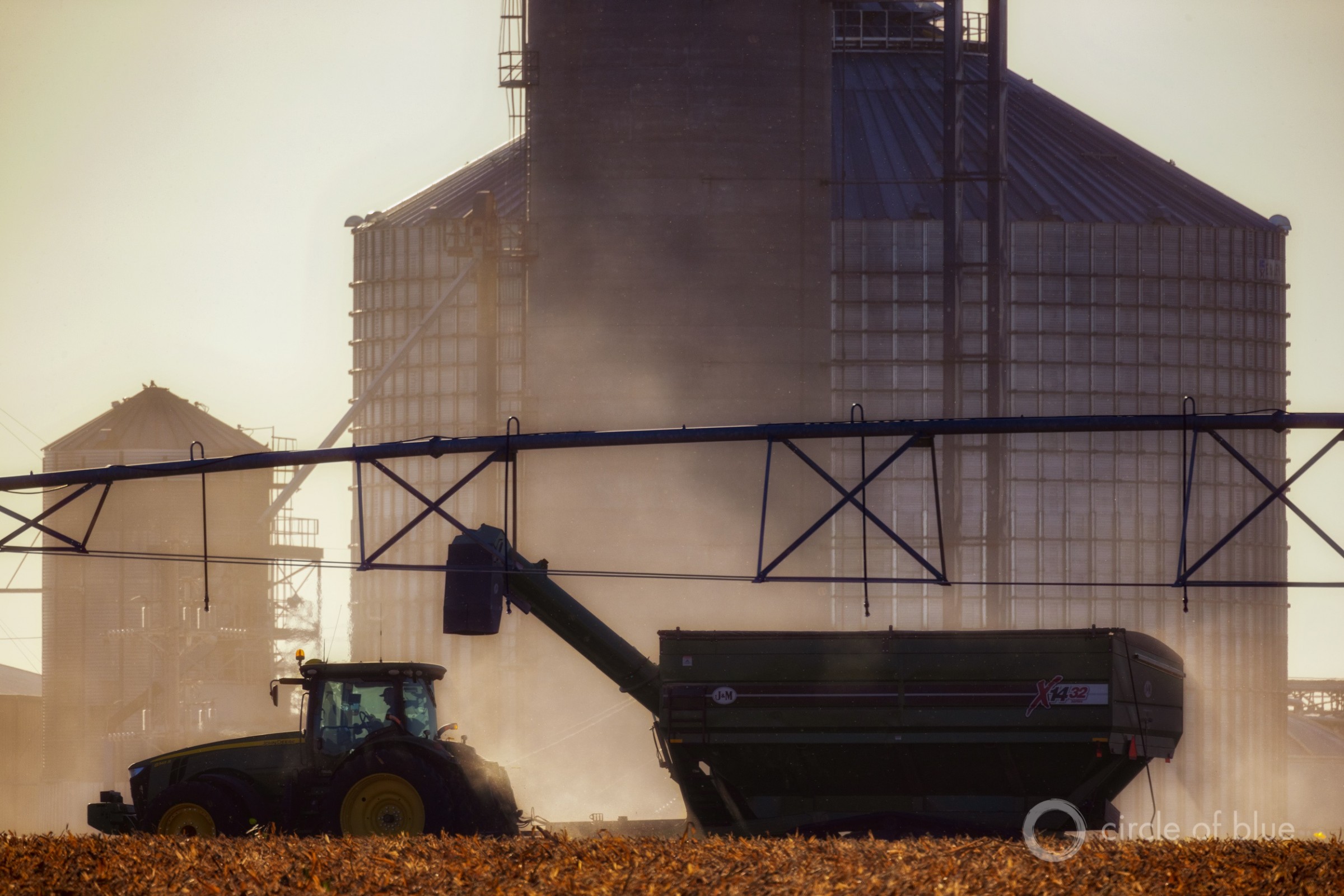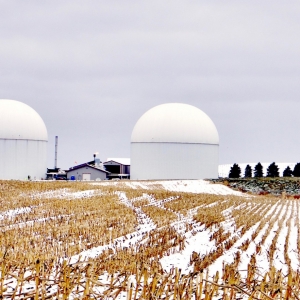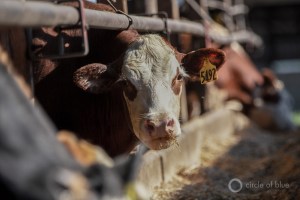The Stream, December 6, 2023: As U.S. Airlines Consider Corn-Based Fuel, Groundwater Could Be Limiting Factor

Grain harvest in Nebraska, 2021. Photo © J. Carl Ganter / Circle of Blue
YOUR GLOBAL RUNDOWN
- Airlines throughout the United States are pushing for a switch to corn-based ethanol, a lower-carbon fuel — but the required groundwater reserves may not hold up.
- Droughts and erratic storms in Greece are driving an uptick in olive thefts.
- Torrential rains and landslides devastated northern Tanzania this weekend, the latest storm to hit the region as its rainy season continues en force.
- In Palestine, olive farmers struggle to continue their growing practice as settlers and soldiers destroy their orchards.
In southern Mexico City, efforts to study and save wild axolotls require the reintroduction of an ancient farming method.
“Chinampaneros… are an endangered species, too.” — María Huitzil, a doctoral student at Metropolitan Autonomous University in Xochimilco.
Axolotls used to live in abundance in the Xochimilco wetlands, historic homelands and a UNESCO heritage site located in the southern region of present-day Mexico City. The amphibian was, and remains, an important Mexican cultural symbol. But overdevelopment, pollution, and the introduction of non-native fish in the city of 22 million people has put the beloved animal’s wild population at risk, the New York Times reports. Scientists are no longer sure if any wild axolotls remain.
To reach the answer, and to help save axolotls and their natural habitats, scientists in Mexico City have decided that pushing for the revitalization of ancient farming techniques — those that once supported these precious wetlands — could be the most effective course of action.
A “vast network of canals surrounding farming plots,” called chinampas, used to be ubiquitous in Xochimilco. The farming technique uses no fertilizers or chemicals, sequesters carbon from the atmosphere, and facilitates a reciprocal relationship between crops and axolotl habitat. But in recent years, it has been tempting for farmers “to convert their chinampas to restaurants, bars and soccer fields and to let small canals dry up.”
Researchers studying axolotls are working to convince farmers to continue or revitalize their chinampas. At the same time, financial support for chinampaneros is crucial.
— Christian Thorsberg, Interim Stream Editor
Recent WaterNews from Circle of Blue
- Will Energy From Manure Help or Harm Water Quality in Michigan? — Chevron and two utilities are building big methane biodigesters on the state’s largest dairies.
- Billions in Federal Assistance after New Mexico’s Largest Wildfire. But Little Money to Repair Streams — Stream restoration beset by lack of money and workers.
The Lead
This July, U.S. President Joe Biden declared that over the next 20 years, “farmers are going to provide 95 percent of all the sustainable airline fuel.” This alternative comes in the form of ethanol, made from corn — a crop which requires hundreds of gallons of water for every one gallon of ethanol it produces, the New York Times reports.
As airlines embrace the potential switch (United Airlines, for example, has already signed a contract with an ethanol company in Nebraska to “power 50,000 flights a year,” and Delta Airlines announced a new sustainable fuel hub would be opening in Minnesota) those in America’s 100 million-acre Corn Belt aren’t quite sure groundwater reserves can support the cleaner-fuel transition.
The Times reports that today, “nearly 40 percent of America’s corn crop is turned into ethanol, up from around 10 percent in the mid-2000s.” The use of irrigation is also on the rise. So taxing is the production of corn-based ethanol on groundwater reserves, that many have long wondered if it truly shows any marked benefits compared to fossil fuels.
The airlines are arguing that switching to ethanol would allow them to lower airfare prices, which would otherwise continue to climb if they were forced to continue using other, costly alternatives to jet fuel. Others have considered the state of the ethanol industry — that, after losing their influence in the EV-saturated car industry, switching to aviation is a prudent next-best step.
Worries of drought and groundwater depletion continue, especially as research shows the eastward movement of arid weather patterns, stretching back for decades. Today, the border runs through Minnesota, Iowa, and Missouri, key members of the nation’s corn belt.
In context: U.S. Irrigation Continues Steady Eastward Expansion
This Week’s Top Water Stories, Told In Numbers
50
Percent by which Greece’s annual olive harvest has fallen this year, as a combination of storms and droughts have destroyed thousands of crops across the country, Reuters reports. Amidst the shortages, olive and olive oil thefts are on the rise. Farmers have been forced to install security cameras on their lands, patrol at night, and harvest as quickly as possible.
68
Number of people who were killed this weekend in Tanzania, as torrential rains and landslides battered the country’s northern regions, Al Jazeera reports. Some 5,600 people were affected by the weather, and 750 acres of farmland were destroyed. The event is the latest in a series of recent, devastating storms to have hit southeastern Africa. Kenya, Ethiopia, and Somalia have experienced similar losses over the past few weeks.
On the Radar
Close to 100,000 Palestinians rely on the harvesting of olives for their source of income, a livelihood that has been pushed to the brink as bombings and water cutoffs have destroyed land and left crops to wither, Mongabay reports. As the human death toll mounts, more than 3,000 olive trees, cultural symbols of peace, have also been killed. Illegal settlers and members of the Israeli military have set fire to orchards as violence against farmers has spiked.
More Water News
Weather Stations: A “scarcity of weather stations in the Global South” — which are used to measure rainfall, temperature, and warn against extreme weather events — continues to burden communities in Africa, where just 37 meteorological centers cover a continental population of 1.2 billion people, many of whom feel unequal effects of the climate crisis, Yale Environment 360 reports.
Cyberattacks: NPR reports that an Iran-linked hacking group was “actively targeting and compromising” U.S.facilities for their usage of an Israel-made computer system. While “less than 10” water facilities were affected, and no known disruptions to reserves were made, the event served as a reminder of the vulnerability of water supplies to cyberattacks.
In Context: Water Sector Prepares For Cyberattacks
Christian Thorsberg is an environmental writer from Chicago. He is passionate about climate and cultural phenomena that often appear slow or invisible, and he examines these themes in his journalism, poetry, and fiction.







Leave a Reply
Want to join the discussion?Feel free to contribute!